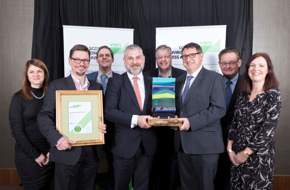Highlights
- Glenmorangie’s Anaerobic Digestion plant purifies up to 95% of the waste water that the distillery releases into the Firth
- The remaining 5% of the organic waste naturally cleaned by the oysters – nature’s ecosystem champions.
- Over 10 years, 12 million tonnes of effluent has been treated, with a reduction of 45,000 tonnes of carbon dioxide from the discharge.

Glenmorangie is a distillery, Scotland, that produces single malt Scotch whisky.
The distillery is owned by The Glenmorangie Company, which also owns the Ardbeg distillery on the isle of Islay, and is part of the French group Moët Hennessy-Louis Vuitton (LVMH).
In partnership with Heriot-Watt University and the Marine Conservation Society, Glenmorangie has pioneered the Dornoch Environmental Enhancement Project (DEEP).
This is a ground-breaking initiative to restore Native European oysters to the Dornoch Firth.
The project’s vision is to restore long-lost oyster reefs to the Firth, to enhance biodiversity and also act in tandem with Glenmorangie’s new Anaerobic Digestion (AD) plant, which will purify the by-products created through the distillation process – an environmental first for a distillery.
VIBES credentials
Glenmorangie won the VIBES Hydro Nation Award in 2017 and is also a VIBES sponsor.
Dr Peter Nelson, Operations Director at The Glenmorangie Company, said: “Winning the Hydro Nation Award is a real testament to the innovative work and commitment from everyone at The Glenmorangie Company and our partners at Heriot Watt University and The Marine Conservation Society.
“Working towards achieving a sustainable future is key to our collective ambitions. We hope by taking our place amongst many excellent companies working to deliver a sustainable future will inspire more organisations to make a difference.”
Environmental and business benefits
- Glenmorangie’s Anaerobic Digestion plant purifies up to 95% of the waste water that the distillery releases into the Firth
- The remaining 5% of the organic waste naturally cleaned by the oysters – nature’s ecosystem champions.
- Over 10 years, 12 million tonnes of effluent has been treated, with a reduction of 45,000 tonnes of carbon dioxide from the discharge.
- The DEEP project seeks to restore oysters to the Dornoch Firth for the first time in over 100 years.
- In pursuit of their vision to enhance the marine biodiversity of the Dornoch Firth, Glenmorangie and its partners last year placed 300 oysters in its protected waters, to confirm the species could survive.
- For the second phase of the project which began in October 2018, a total of 20,000 oysters are to be introduced into the sea near Glenmorangie’s Highland home by June 2019.
- The long term vision is to recreate a self- sustaining native oyster reef - the first time this has been attempted in a Marine Protected Area in Europe.
- Glenmorangie has invested £5M in anaerobic digestion and £1M in oyster restoration since the start of the project. Overall ambition for the next 5 years is to create a 40 hectare reef with 4 million Oysters.
Wider benefits
- The biogenic reef will improve the overall water quality of the Dornoch Firth; create a biodiversity hotspot and demonstrate the potential for oysters to sequester carbon.
- Engagement with Scotland’s communities through the project's support for a seasonal MCS Information Officer at the distillery and outreach project to local schools.
- Employees are engaged through annual beach cleans and other MCS lead projects.
- Enhancing and significantly growing the sustainable production of Native European Oysters in Scotland is expected to create and secure jobs in Scotland’s rural economy.
- Creation of new intellectual property based on the DEEP science and technology creates new economic opportunities. For example, water quality enhancement that is replicable across the globe.
- Glenmorangie is also sponsoring a range of scientific research projects to support DEEP’s deliverables. Current research covers the filtration potential for European oyster habitats; wider biodiversity benefits as well as demonstration of oyster restoration potential.
- R&D is also looking at the sustainable output of a Native European Oysters fishery in Scotland focusing on how to enhance the oyster habitat to increase stock.
Website: www.glenmorangie.com